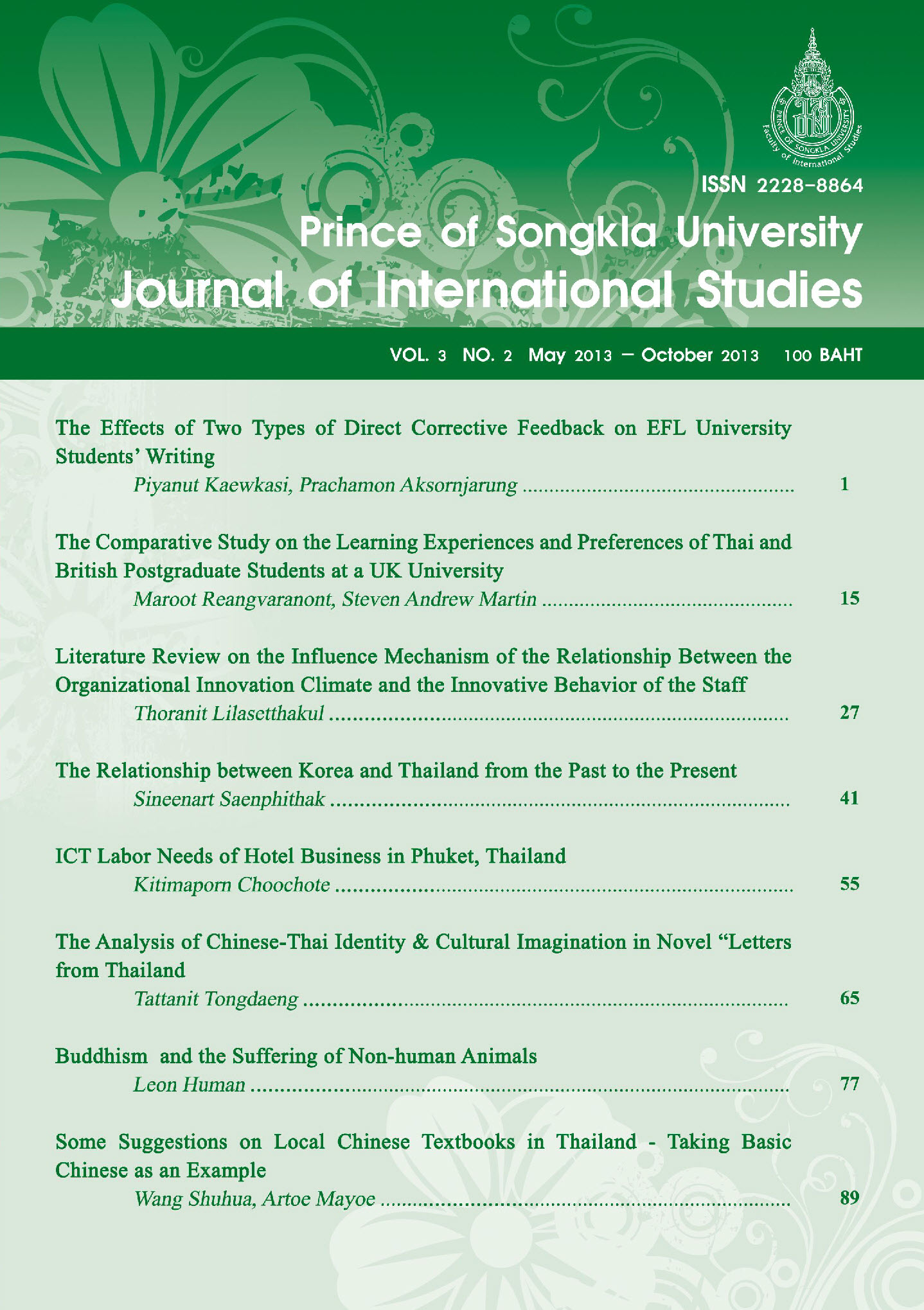Buddhism and the Suffering of Non-human Animals
Main Article Content
Abstract
This article attempts a cursory overview of some of the conceptual issues surrounding the status of non-human animals in early Buddhism and the Pali Canon.2 It examines to what extent 'degrees' of suffering (dukkha)3 impacts on the conditions of possibility for
enlightenment, and also explores whether the relative position of animals in Buddhist cosmology results in their denigration. The first section looks at the Pali terminology standardly used to refer to non-human animals4, and the next section reviews traditional depictions of the animal realm. The result of human-animal co-habitation is briefly touched on in an appendix.
Article Details
Statements and opinions expressed in articles herein are those of the authors and do not necessarily reflect the position of the editors or publisher.
Article, information, text, image, etc. which are published in Journal of International Studies, belong to Journal of International Studies. If anybody or any organization would like to use part or whole of them, they must receive written permission from Journal of International Studies before usage.
References
Clark, S. (1977). The moral status of animals. Oxford: Clarendon Press.
Coetzee, J. (1997). The lives of animals (The Tanner Lectures on Human Values). Retrieved August 20, 2013, from http://tannerlectures.utah.edu/_documents/a-to-z/c/Coetzee99.pdf
Collins, S. (1990). Selfless persons: imagery and thought in Theravada Buddhism. Cambridge: Cambridge University Press.
Collins, S. (2006). Nirvana and other Buddhist felicities. Cambridge: Cambridge University Press.
Derrida, J. (2008). The animal that therefore I am. New York: Fordham University Press.
Gaita, R. (2004). Good and evil: an absolute conception. London: Routledge
Glover, J. (1975). "It makes no difference whether or not I do it". Proceedings of the Aristotelian society, 49, pp. 171- 209
Gombrich, R. (1988). Theravada Buddhism: a social history from ancient benares to modern colombo. London and New York: Routledge.
Gould, S. (1994). Hen's teeth and horse's toes: further reflections in natural history. New York: W. W. Norton
Jordan, W., Barrett, N., Curtis, K., Heneghan, L., Honold, R., LeVasseur, T., Peterson, A., Thiele, L., Van Wieren, G. (2012). "Foundations of Conduct: A Theory of Values and Its Implications for Environmentalism". Environmental ethics, 34, pp. 291 - 312.
Keown, D. (2005). Buddhist ethics: a very short introduction. New York: Oxford University Press.
Majjhima Nikaya: the middle-length discourses. Retrieved August 24, 2013, from http://www.accesstoinsight.org/tipitaka/mn/index.html
Metzinger, T. (2004). Being no one: the self-model theory of subjectivity. Cambridge MA: MIT Press
Midgley, M. (1978). Beast and man: the roots of human nature. London: Routledge
Rahula, W. (1974). What the Buddha taught. London: Grove Press
Regan, T. (1988). The case for animal rights. London: Routledge. Samyutta-Nikaya: The grouped discourses. Retrieved on August, 22, 2013, from http://www.accesstoinsight.org/tipitaka/sn/
Sangharakshita (1987). The meaning of orthodoxy in Buddhism: a protest. London: Windhorse Publications.
Sciberras, C. (2008). "Buddhism and Speciesism: on the Misapplication of Western Concepts to Buddhist Beliefs". Journal of Buddhist Ethics, 15, pp. 214 - 240 . Retrieved August 10, 2013, from http://www.buddhistethics.org/
Singer, P. (1976). Animal liberation: a new ethics for our treatment of animals. London: Jonathan Cape
Singer, P. (1998). A vegetarian philosophy. Retrieved August 25, 2013, from http://www.animal-rights-library.com/texts-m/singer05.htm.
Spiro, M. (1971). Buddhism and society:a great tradition and its Burmese Vicissitudes. London: Allen & Unwin.
Stewart, J. (2010). "The Question of Vegetarianism and Diet in Pali Buddhism". Journal of Buddhist Ethics, 17, pp. 100 - 138. Retrieved August 1, 2013, from http://www.buddhistethics.org/
Sugatananda, A. (2009). "The Place of Animals in Buddhism". Bodhi Leaves, 3. Kandy: Buddhist Publication Society
The Cambridge Declaration on Consciousness (2012). Available online at http://fcmconference.org/img/CambridgeDeclarationOnConsciousness.pdf Vinaya Pitaka: the basket of the discipline. Retrieved August, 6, 2013, from http://www.accesstoinsight.org/tipitaka/vin/index.html
Waldau, P. (2000) "Buddhism and Animal Rights" in Keown, D. (ed.), Contemporary Buddhist Ethics. pp. 81 - 112. London: Routledge
, S. (2008). In defense of Žižek lost causes. London & New York: Verso


